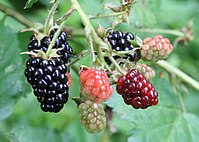பழங்கற்கால உணவுமுறை
பழங்கற்கால உணவுமுறை அல்லது பேலியோ உணவுமுறை (Paleolithic diet) என்பது பழங்கற்கால, குகை வாழ் மாந்தர்களின் உணவுமுறையாகும். பழங்கற்காலத்தில், மாந்தர்கள் வேட்டை ஆடுபவர்களாகவும் உணவு சேகரிப்பவர்களாகவும் இருந்தனர். அவர்கள் வேளாண்மையைக் கண்டறியாததால் தானியங்களைக் கூடுதலாக உண்ணவில்லை. மாறாக, காய்கள், கனிகள், வேர்கள், கொட்டை வகைகள், ஊன், மீன்கள் போன்றவற்றை உண்டு வாழ்ந்தனர். இன்று மாவுச்சத்து கூடுதலாக உள்ள உணவுகளை உண்பதால் ஏற்படும் பாதிப்புகளுக்கு உணவியலாளர்கள் இந்த பழங்கற்கால உணவுமுறையை மாற்றுமுறையாக வலியுறுத்துகிறார்கள்.[1][2][3]

பழங்கற்கால உணவுமுறையில் உண்ணக்கூடிய உணவுகள்
தொகு- கிழங்குகளில்லாத, பீன்ஸ் இல்லாத, பருப்புகள் இல்லாத காய்கறிகள்
- பாதாம், பிஸ்தா, மகடாமியா, வால்நட்ஸ்
- மஞ்சள் கருவுடன் முட்டைகள்
- கொழுப்புடன் கூடிய தோல் நீக்காத இறைச்சி வகைகள்
- அனைத்துவகை கடல் உணவுகள்
- நெய், வெண்ணெய், சீஸ், பனீர், முழுக்கொழுப்பு பால், தயிர், மோர்
- செக்கில் ஆட்டிய தேங்காய் எண்ணெய், நல்லெண்ணெய்
- அனைத்துவகை கீரைகள்
வெளி இணைப்புகள்
தொகுமேற்கோள்கள்
தொகு- ↑ de Menezes et al. 2019: "The Paleolithic diet has been gaining ground in the field of fad diets. It is based on food patterns of human Paleolithic ancestors, about 2.6 million to 10,000 years ago, a period that precedes the advent of industrial agriculture and is different from today's modern society".
- ↑ British Dietetic Association 2014 - "The Paleo diet (also known as the Paleolithic Diet, the Caveman diet and the Stone Age Diet) is a diet where only foods presumed to be available to Neanderthals in the prehistoric era are consumed and all other foods, such as dairy products, grains, sugar, legumes, 'processed' oils, salt, and others like alcohol or coffee are excluded."
- ↑ Ask EN 2010; Johnson 2015; Fitzgerald 2014.